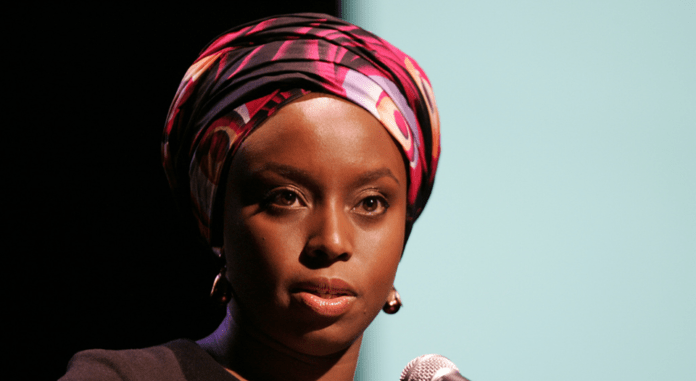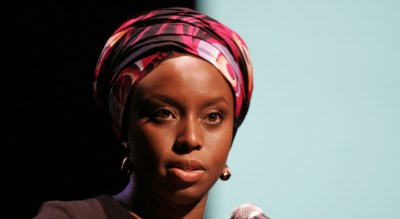
14 Mar Why Chimamanda Ngozi Adichie’s Comments on Trans Women are Wrong and Dangerous
“Chimamanda Ngozi Adichie says she finds it difficult to equate the experience of trans-women with that of women.”
When I say seeing that sentence as I was finishing my evening scroll through Facebook made my stomach fold in on itself, I’m being more literal than metaphorical. The video that sentence captioned—one in which Chimamanda Ngozi Adichie goes on to say “the whole problem of gender in our world is about our experiences” while characterizing trans women’s experiences as living in the world as men before “switching” genders—was disappointing. Watch here for context.
I’m a Nigerian-American writer and feminist who has looked up to Chimamanda Ngozi Adichie ever since Americanah made me feel more seen and at home than any other book I’ve read on being Black in America. I’m also a nonbinary trans person (a group of people Adichie ignored entirely in the video) who is constantly watching the way the world treats trans people, especially Black trans women.
Adichie saying that trans women once experienced male privilege before “changing” genders and implying that this disqualifies them from being women without an adjective erases their experiences of womanhood at all stages of their lives. It further ignores the very real violence they face (Chyna Gibson’s name still fresh on our lips, images of Dandara dos Santos’s brutal murder splashed across social media, at least seven trans women of color murdered in the US since 2017 began) and leaves nonbinary trans people and trans men out of the conversation entirely. It also speaks to the hypocrisy of trans-exclusionary feminism—Adichie has shut down a white man trying to define racism with a swiftness and called out “the danger of a single story,” yet here she is telling a single (inaccurate) story about trans women as a cisgender feminist who appears to have little knowledge of trans experiences.
But more disappointing than Adichie’s words were the number of other cis people I saw coming out of the woodwork to agree with her, defend her, or tell trans people they didn’t hear what they just heard. Maybe these cis allies, like Adichie, think believing “transgender people should be allowed to be” is benevolent enough to constitute acceptance and progressiveness, and so they don’t see the harm in calling trans women privileged for being misgendered as men in a society that seeks to destroy them for being the women that they are. Or maybe they’ve quietly held the belief that trans people’s experiences of gender are less valid than those of their cisgender counterparts but have stayed mum on the matter, not wanting to seem insensitive now that more trans people are speaking for themselves and their own experiences. Maybe they find Adichie’s words refreshing—finally, they think, here is a prominent feminist saying what they’ve been quietly believing, who gives voice to their assumptions about what it’s like to be trans in a world that fails to recognize the existence of trans people.
To those people, I say this: your viewpoint is old and tired as hell. Trans exclusionary feminism is not new or interesting or nuanced or enlightened just because the normally on point Adichie failed to recognize that it is not her place to tell trans women who they are or how they live in the world. The feminist movements of our time have been historically weighed down by gender essentialism, cissexism, transphobia, and a belief that trans people are not who they say they are but who they are violently pressured to be.
You cannot fix your mouth to say you are an ally to trans people if you think Adichie’s decision to talk over trans women was appropriate. You cannot claim to shed tears for the trans women out here being killed while defending Adichie’s belief that trans women aren’t really women (and yes, that’s what she said) because that belief upholds such violence. You cannot talk about trans people as if we’re talking points or theoretical concepts and ignore our own words about our experiences with gender and call that allyship. Trans people are working, living, and speaking before your eyes about who we are and what we need—stop looking to cis feminists to dictate how you see and support us.
In short, you need to listen to trans people more than you need to speak for or about us. Anything else is further marginalizing a group of people who cannot afford to be further marginalized.



